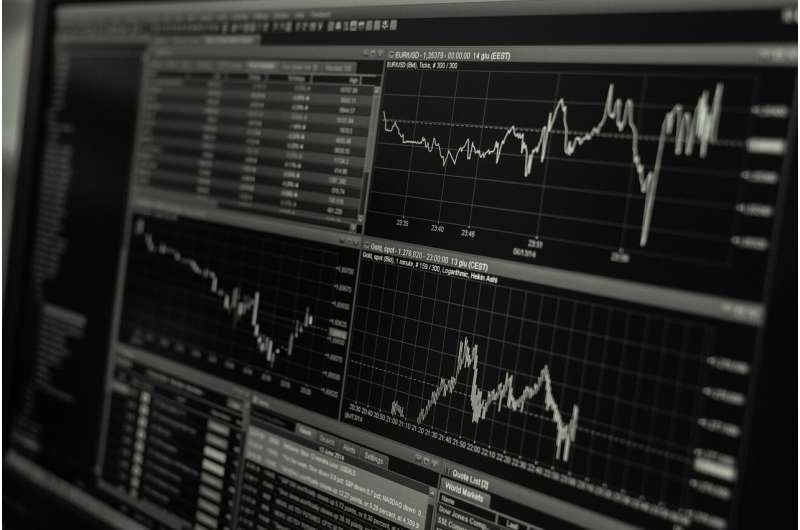Bankers' tone of voice can boost stock markets and soothe investor fears

Financial leaders sounding positive when they answer journalists' questions can boost share prices and soothe investors' fears about market risk, a new study reveals.
Using sophisticated computer algorithms, researchers analyzed the tone of voice used by US Federal Reserve (Fed) chairs during Federal Open Market Committee (FOMC) press conferences and examined the impact on financial markets.
They discovered a more positive voice tone leads to an increase in share prices. Market response builds and after five days, the return on the SPDR S&P 500 Trust—a popular fund comprising of 500 high-profile U.S. stocks—shows a marked increase before leveling out.
The international research team from the Universities of Birmingham and Reading, alongside University of California, Berkeley have published their findings in the National Bureau of Economic Research.
They reveal that a positive voice tone decreases current and anticipated market volatility—consistent with the principle that central banks can shape uncertainty about future economic conditions. An upbeat tone also reduces investors' expectation about interest rate risk.
The researchers discovered the market's response to a unit decrease in voice tone matches the reaction observed after a one-standard-deviation forward-guidance shock, which generally prompts companies to increase their output, raise prices and invest in new capital.
Sasha Talavera, Professor in Financial Economics at the University of Birmingham, commented: "Our study shows that it's not just what central bankers say, but how they say it which matters. This reveals important policy implications and does not make the job of central bankers easier. It possibly adds another qualification of voice control for the highest level positions—to paraphrase Ronald Reagan, how can a Fed chair not be an actor?
"Market participants tend to look for more information through 'non-scripted' aspects such as voice tone or body language of the Fed Chair. These non-verbal cues can signal the Fed's perspective on economic outlook and the course of future monetary policy."
The team developed a novel deep learning computer model to quantify vocal emotions embedded in the answers given by Fed Chairs during FOMC press conferences from 2011 to 2019.
They then measured the aggregate voice tone for each press conference as the ratio of the difference between the positive (happy or pleasantly surprised) answers and the negative (sad or angry) answers to the total number of positive and negative answers.
On average, Ben Bernanke had more positive emotions in his voice than Janet Yellen, who in turn had generally more positive emotions in her voice than Jerome Powell.
Researchers also classified the text of statements and press conference transcripts into 'hawkish' versus 'dovish' sentiment. Bernanke and Yellen appeared to be more dovish than Powell—potentially reflecting that policy rate increases dominated during Powell's period in the analyzed timeframe.
They found that, whilst variation in voice tone has economically significant effects on the stock market, the bond market tends to take few vocal cues from Fed chairs.
The FOMC consists of 12 members—seven members of the Board of Governors of the Federal Reserve System; the president of the Federal Reserve Bank of New York; and four of the remaining eleven Reserve Bank presidents. The committee holds eight scheduled meetings per year, where it reviews economic and financial conditions, determines monetary policy and assesses risks to price stability and sustainable economic growth.
More information: Yuriy Gorodnichenko et al. The Voice of Monetary Policy, National Bureau of Economic Research (2021). DOI: 10.3386/w28592
Provided by University of Birmingham





















